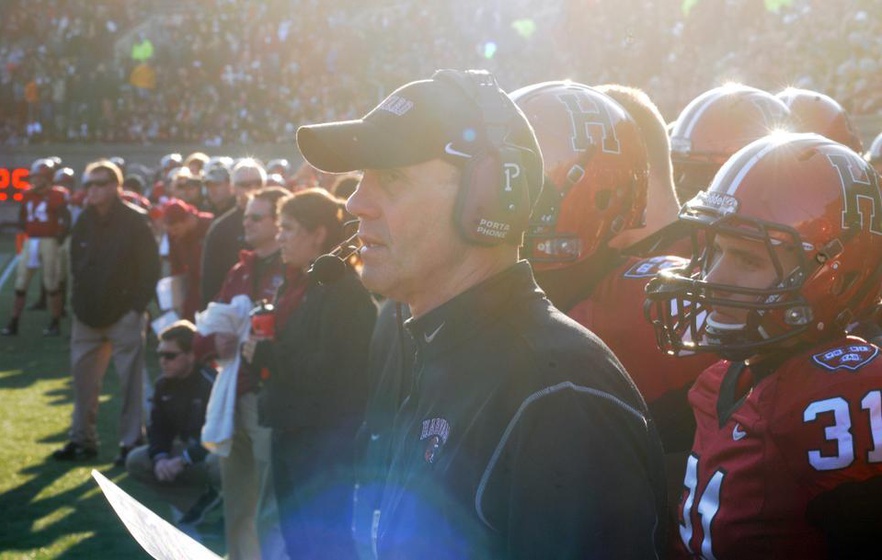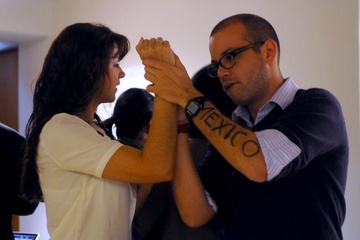I. THE DECISION
It seemed obvious to Jacob that he would graduate Harvard as a member of the football team.
When Harvard recruited Jacob, a student at the College who has been granted anonymity by The Crimson because he did not want to draw negative attention to himself, he was confident in his choice to play football for Harvard. The highly-prized recruit had turned down multiple scholarship offers at Big East schools before choosing Harvard over other Ivy League programs. Local papers reported the news; a blogger from a rival college lamented that Jacob chose head coach Tim Murphy’s program over theirs.
But the summer before his freshman year, Jacob started to have second thoughts about his football career.
“My love for [football] kind of diminished after high school,” Jacob said. “I wasn’t really sure if I wanted to spend so much time with something I didn’t want to do with the passion that I used to.”
Jacob arrived in Cambridge for summer training camp weeks before freshman move-in day. After a week, he had made up his mind. He informed Murphy that he did not wish to play.
Murphy’s reaction surprised Jacob.
“I spoke to the head coach, and he took it very hard,” Jacob said. “[He] actually tried to tell me that I wouldn’t be able to attend school because my admission was contingent upon playing, which I knew wasn’t true.”
Murphy remembers the exchange differently.
“I questioned whether [Harvard] was the right place for him,” Murphy said. “We emphasize very early and very often, not only with the student-athletes but also with the parents, that you don’t have to play. It’s your prerogative. But we also emphasize, very vigorously, that your commitment to play football at Harvard is something that neither one of us should take lightly.”
II. THE ADMISSION
Jacob returned home after walking off the team and planned to enroll in a community college for the first semester. He said that he was not sure whether he would be able to attend Harvard until his mother contacted the admissions office in an attempt to refund his deposit.
“I was in the state of mind that I wouldn’t be able to attend Harvard because of [quitting the team],” Jacob said. “I was actually in the process of signing up for community college classes just for a semester, and then transferring, when my admissions officer called and explained to me the situation. [He] told me that what I had been told was completely erroneous and that I could actually attend, that I got in off of merit.”
Ivy League recruiting policies require that admitted student-athletes must meet certain academic standards determined by the Academic Index, a conference-wide performance measurement that incorporates GPA and standardized test scores. According to Dean of Undergraduate Admissions and Financial Aid William R. Fitzsimmons, athletic ability is just one factor that his department considers when admitting student-athletes.
“I would start with what we call the broken leg test—a term we’ve used in Harvard admissions for many decades,” Fitzsimmons said. “Say a student who happens to be an athlete or a dancer breaks his or her leg in five places and can never participate. Is this still a good admission? Will the person be able to take the energy, the drive, the commitment that went into becoming a great dancer or great athlete...and turn it into something positive?”
While potential Harvard student athletes are evaluated holistically in the admissions process, an athletic commitment nevertheless carries a special weight. It provides a means through which a student-athlete may reserve a spot on a coveted team and, by extension, a spot in a coveted school. In his interview, Murphy emphasized the moral implications of a student-athlete’s agreement to play for Harvard.
“If you do have kids who show up and decide not to play at all, you’re taking away someone else’s spot who would have, forgive the expression, given their right arm to play at Harvard,” Murphy said.
Frank, a student at the College who was granted anonymity by The Crimson because of the sensitive nature of his decision, was recruited for football but walked off the team during his freshman spring. In an email interview, he acknowledged the complexity of his decision.
“Not only was I abandoning the team, but I essentially ‘used’ the recruiting process to get accepted, and then quit,” Frank wrote. “I understand why people have a problem with that—it’s unfair to the hundreds of kids who don’t get accepted, including other football recruits who wouldn’t have quit.”
Because Ivy League schools do not offer athletic scholarships, leaving a team may come at a smaller cost to a potential athlete at Harvard than at another Division I school, where a former athlete can lose his or her scholarship and the financial support it provides. Yet Jacob’s case was an unusual one, according to Murphy.
“We’ve been really fortunate that in the 20 years we’ve been here, we’ve only had two kids in 20 years basically show up and say ‘I’m not going to play’ without ever putting a pad on,” Murphy said. “In that situation, to be perfectly honest, I’m not only not happy about it, but I tell them, ‘Listen, when you make a commitment in life—you look someone the eye and you shake their hand—and then you don’t honor that, that is very unethical, it shows a lack of integrity.’”
Jacob considers his decision unfortunate, but justified.
“My intentions were never bad in any way,” Jacob said. “I wasn’t using it or anything. It was just a genuine change of heart and change of mind that led to me not wanting to play.”
III. THE MOTIVATION
Reasons for leaving a team are often more nuanced than they are clear-cut, with various push and pull factors separating athletes from the sports they love. Not every split is motivated by changes of heart; injuries and academic pressures play large roles in the decision. Joey G. Wall ’14 decided to leave lightweight crew after walking onto the team freshman year and experiencing multiple injuries.
“The reason I stayed after my freshman year is because I thought I had potential in the sport,” Wall said. “I felt the sky was the limit my freshman year, and my sophomore year I felt like I hit a glass ceiling.”
Spencer L. de Mars ’13 applied to Harvard without being recruited for basketball but learned senior spring of high school that he would have a chance to play for the team. After playing for Harvard for a year, de Mars stopped to pursue other opportunities on campus.
“Playing a varsity sport was not the best fit for my goals and how I wanted to spend my time at Harvard,” de Mars said. De Mars said that at Harvard, a stat that features over 400 extracurricular clubs and activities, there are many other opportunities for students to enjoy if they decide not to pursue a collegiate athletic career.
“At Harvard, the opportunity cost of your time is a lot higher because there is so much else going on at the school,” de Mars said. “Because athletes are talented in other areas, that means that there are a lot of other things you could be doing with your time.”
Wall noted that the emphasis here is on the student aspect of student-athlete. For a lot of his peers on the team, balancing academics and athletics had become difficult.
“I think the first things for walk-offs are academics and balancing your time,” Wall said. “Crew is something that you have to schedule your life around. You can definitely do it if you set your mind to it...but it takes a discipline to do. You need to be really purposeful with how you spend your hours.”
IV. THE DROP
Not all walk-offs are recruited athletes. Scott J. Yim ’13 walked onto the men’s volleyball team midway through his freshman year after playing on the club team. Yim played for teams that competed at the junior Olympic level during high school and after a rash of injuries depleted Harvard’s varsity team, he was brought up from the club team.
“I thought it was a really neat opportunity,” Yim said. “I could have played Division III somewhere else but the academics weren’t what I wanted. I met with my coach and went to a few practices and realized I could keep up with the [varsity] team.”
After growing close to his teammates, Yim said that quitting the team sophomore year was not easy for him. A biomedical engineering concentrator, Yim was torn between a series of extracurricular opportunities and felt like he was sacrificing physical and mental health to stay on the team.
“I really wanted to maximize my time at Harvard,” Yim said. “I began to feel that with only 24 hours in a day there were so many other things I wanted to do. I wasn’t spending enough time with friends or sleeping enough and I was getting sick during season. Fighting that is difficult when you aren’t 100 percent and my mental health and physical health [suffered].”
Yim’s experience is far from unique. According to coach Linda Muri, lightweight crew can take up to 80 walk-ons in a given year. It is one of two sports (along with its female counterpart) to offer freshmen-only teams. Although Muri said that almost all the team’s recruits stay for the team, she said that a 75 percent attrition rate for the walk-ons is normal.
“I don’t see it as a horrible drop-off,” Muri said. “I think that is understandable.” For many freshmen who have never rowed before, the experience can be foreign and demanding. “It takes a bit to go out and try something you have never done before and learn how to do it and compete against guys who have achieved [in the sport] nationally and internationally. Coming out for the team alone says a lot about the character of the team.”
For Eamon C. O’Brien ’16, academics and the time commitment were key factors in causing him to drop the sport. Although he said that rowing has a lot of prestige—calling it the “quintessential Harvard extracurricular”—ultimately he did not have the 20 hours a week to give to rowing that the sport demanded.
“Practice would be maybe 90 minutes to two hours but we would be doing two hours of stuff outside of practice,” O’Brien said, adding that having friends quit the team provided a ripple effect across the freshmen group. “It got down to the recruits and a couple guys who were really dedicated to it. A friend of mine dropped with another guy and they started a domino effect. After them, everyone started dropping.”
V. THE SACRIFICE
Unlike Jacob, Frank entered Harvard without doubts. But his love for football collided with the demands of college sports. Frank struggled through a freshman football experience and described himself as “unhappy.”
“I had to make a choice—either continue and have my grades and happiness drop, or stop playing the sport I love,” he said.
Frank turned to Harvard’s Bureau of Study Counsel for advice before informing the football staff of his decision. He now watches from the sidelines with a new perspective and appreciation for the demands on student-athletes. While other students see only the results, Frank said the experience is more about the process, the sacrifices that people can’t see once the whistle blows.
“I think some people view their position as glamorous, but they spend countless hours training for their sport, and then countless hours studying even though they are dead tired,” Frank said. “That’s the hardest part about being an athlete here. It’s not the 5 a.m. wake up. It’s the exhaustion that comes with it afterwards.”
For some student athletes, that exhaustion becomes unendurable, and a decision that had once seemed unimaginable, to leave a sport that may have brought them to Harvard in the first place, becomes inevitable.





